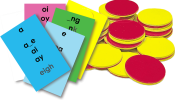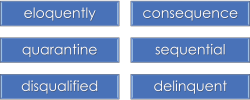
Know what skills students have and do not have at all times.
Embedded Formative Assessment
RoxieReading embeds formative assessment within the curriculum. The activities of RoxieReading are designed to provide not only a way for students to learn, but also provide continual feedback on the progress of students on phonemic awareness levels, grapheme knowledge, decoding skills, spelling, and knowledge of word structure. Students respond individually in tangible ways in every lesson so it is easy for you to see what they know and do not know. This allows you to adjust the curriculum for maximum student growth. Student gains can be recorded on the monitoring sheets provided within the curriculum.
You will be able to assess reading skills in each lesson through these activities.




Word Building
Sound Card Game and Chip Game
Dictation
Challenge Words
As students spell on the white board you can assess phonemic awareness levels. Are they able to hear all of the sounds in a word? Are they able to manipulate the sounds in words to change a word to another word? You can also assess their knowledge of word structure. Do they know how to make a vowel long or add a suffix or a prefix? How well do they know the spellings of the sounds?
You can assess whether students instantly hear the beginning, end, and middle sounds. You will also be able to identify which sounds are more difficult for students to distinguish, such as the short /e/ and /i/. You will know when students can hear all the sounds in a spoken word.
Dictation assesses spelling ability, knowledge of graphemes, and knowledge of sentence structure. What types of errors do students continue to make? Do they know how to spell the sounds? Do they know how to add prefixes and suffixes?
Challenge words are words that are not at students’ reading levels so there is little risk they have memorized the word. They are forced to decode the words. Are they able to break a word apart? Do they pay attention to the markers? Do they know what sounds the graphemes represent? Are they able to put each section of the word together?
Always check phonemic awareness skills!
The goal: All students must have competent phonemic awareness skills. This is essential for becoming a proficient reader. When you give them a spoken word, can they hear the beginning sound? The end sound? The middle vowel sound? All of the individual sounds? This skill is foundational for understanding the alphabetic principle, the principle that speech sounds can be represented in print.
The ability to read is not a sign that students have phonemic awareness.
Monitor all students for phonemic awareness, including your best students. Some individuals find it easy to memorize words but do not have phonemic awareness and do not understand the structure of the language. They have memorized the word without phonological knowledge. This strategy of memorizing “works” as long as there are picture clues and the words are in the spoken vocabulary of the student. However, most individuals “crash” by fourth or fifth grade, and the once good reader is now a struggling reader because the foundational skills are missing.
Students who cannot read may have phonemic awareness skills.
These students need to learn how to spell speech sounds and be shown how to decode both small and multisyllable words. They may read slowly at first, but with practice reading, they will become skilled readers.